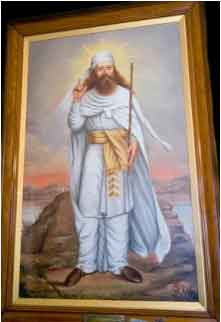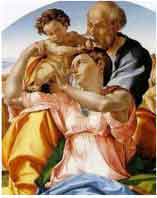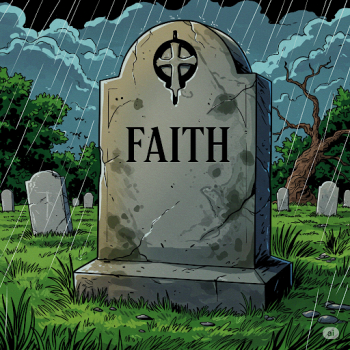Boxing Day originated from this Christian feast day, as St. Stephen was one of the first "social workers" of the Church who organized meals for the poor. In some homes, a box is set next to the Christmas tree, and this "St. Stephen's box" is filled with clothing and other articles for the poor. According to popular song, Good King Wenceslas was able to enjoy his own holiday celebration -- because he was a king who "looked out, on the Feast of Stephen" with a compassionate eye for the cold and poor. (Read the song lyrics here.)
More on Saturday
Zoroastrians mark the death anniversary of the prophet Zarathustra, the founder of the Zoroastrian religion. Historical accounts vary widely -- some claim he lived sometime around 6000 B.C.E., while many scholars argue that it was closer to 2000 B.C.E. -- but generally, it's agreed that Zarathustra, or Zoroaster, died at the age of 77. (PBS published a short piece on this observance in 2004.) It is unknown how Zarathustra died; some say he was killed while in prayer by a foreign enemy of the king and others believe he died a peaceful, natural death.
 The messages of Zarathustra are more concrete than the historical accounts about his life, as his messages were written in the Gathas Zoroastrian scriptures. Tradition holds that Zarathustra wrote the Gathas under divine inspiration from God (as opposed to the words of these scriptures being a direct revelation from God). (The Parsi Zoroastrian Association of Singapore offers lots of information on Zoroaster's life, philosophies, and more.) In no sect of Zoroastrianism is Zarathustra regarded as a divine figure, and devotees teach that this prophet made a devoted effort himself to communicate with God. Zoroastrian followers have dwindled in numbers through the years and, today, they are most prevalent in India.
The messages of Zarathustra are more concrete than the historical accounts about his life, as his messages were written in the Gathas Zoroastrian scriptures. Tradition holds that Zarathustra wrote the Gathas under divine inspiration from God (as opposed to the words of these scriptures being a direct revelation from God). (The Parsi Zoroastrian Association of Singapore offers lots of information on Zoroaster's life, philosophies, and more.) In no sect of Zoroastrianism is Zarathustra regarded as a divine figure, and devotees teach that this prophet made a devoted effort himself to communicate with God. Zoroastrian followers have dwindled in numbers through the years and, today, they are most prevalent in India.
Sunday
Many Shi'a Muslims honor the martyrdom of Muhammad's grandson and Sunni Muslims honor Moses' and Muhammad's fasts on the Day of Ashura (spellings vary). The word "Ashura" means "10th," as this is the 10th day of the Islamic month of Muhurram.
Shi'a Muslims spend the day in mourning for Husayn ibn (or Hussein) Ali, the grandson of the Prophet Muhammad, who died in the Battle of Karbala on this date in 61 AH (or, according to the Gregorian calendar, in A.D. 680). After the Prophet Muhammad died, there was great conflict over who would succeed Muhammad in leadership, and this is when the official split of Sunni and Shi'a Muslims began -- Shi'as believing that Muhammad's bloodline should succeed him in leadership, and Sunnis differing. (Here is the BBC's explanation.)
During Ashura, it is common for Shi'a Muslims to show public expressions of grief, including self-infflicted pain, reenactment plays, and processions. The place where Ali was killed during battle, Karbala (in modern-day Iraq), has been a place of pilgrimage for Shi'a Muslims ever since.
Sunni Muslims recognize that Muhammad's grandson died on this day, but some fast out of the belief that Moses fasted on this day as a way to thank God for the Israelites' liberation from Egypt. Sunni Muslims believe that Muhammad fasted on this day, too, and recommended that others do so as well. (ReadingIslam has a great article on this.) Unlike the Ramadan fast, this fast is only recommended by Muhammad, and not required. Some Sunnis also fast to commemorate the day that Noah left the Ark.
Also on Sunday
 Jews hold a minor fast on the 10th of the Jewish month of Tevet. The 10th of Tevet venerates the commencement of the siege that Nebuchadnezzar of Babylonia placed on ancient Jerusalem, which eventually led to the destruction of Solomon's Temple (the First Temple) and Babylonia's conquest of the Kingdom of Judea. (Chabad.org has information and a photo.)
Jews hold a minor fast on the 10th of the Jewish month of Tevet. The 10th of Tevet venerates the commencement of the siege that Nebuchadnezzar of Babylonia placed on ancient Jerusalem, which eventually led to the destruction of Solomon's Temple (the First Temple) and Babylonia's conquest of the Kingdom of Judea. (Chabad.org has information and a photo.)
This is a minor observance so, unlike the longer fast of Yom Kippur, the 10th of Tevet fasting begins at sunrise and ends at sunset. Some observe this day as a "general kaddish day," and solemnly remember the victims of the Holocaust. As many of the Holocaust victims have unidentifiable death anniversaries, some Jews honor them on the 10th of Tevet.




